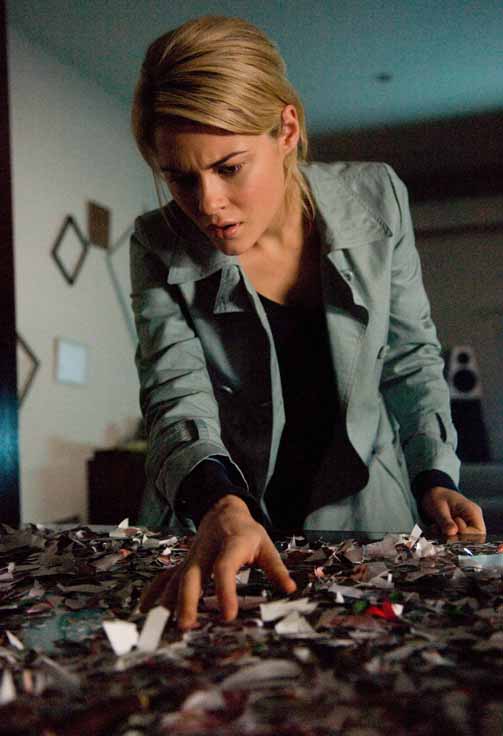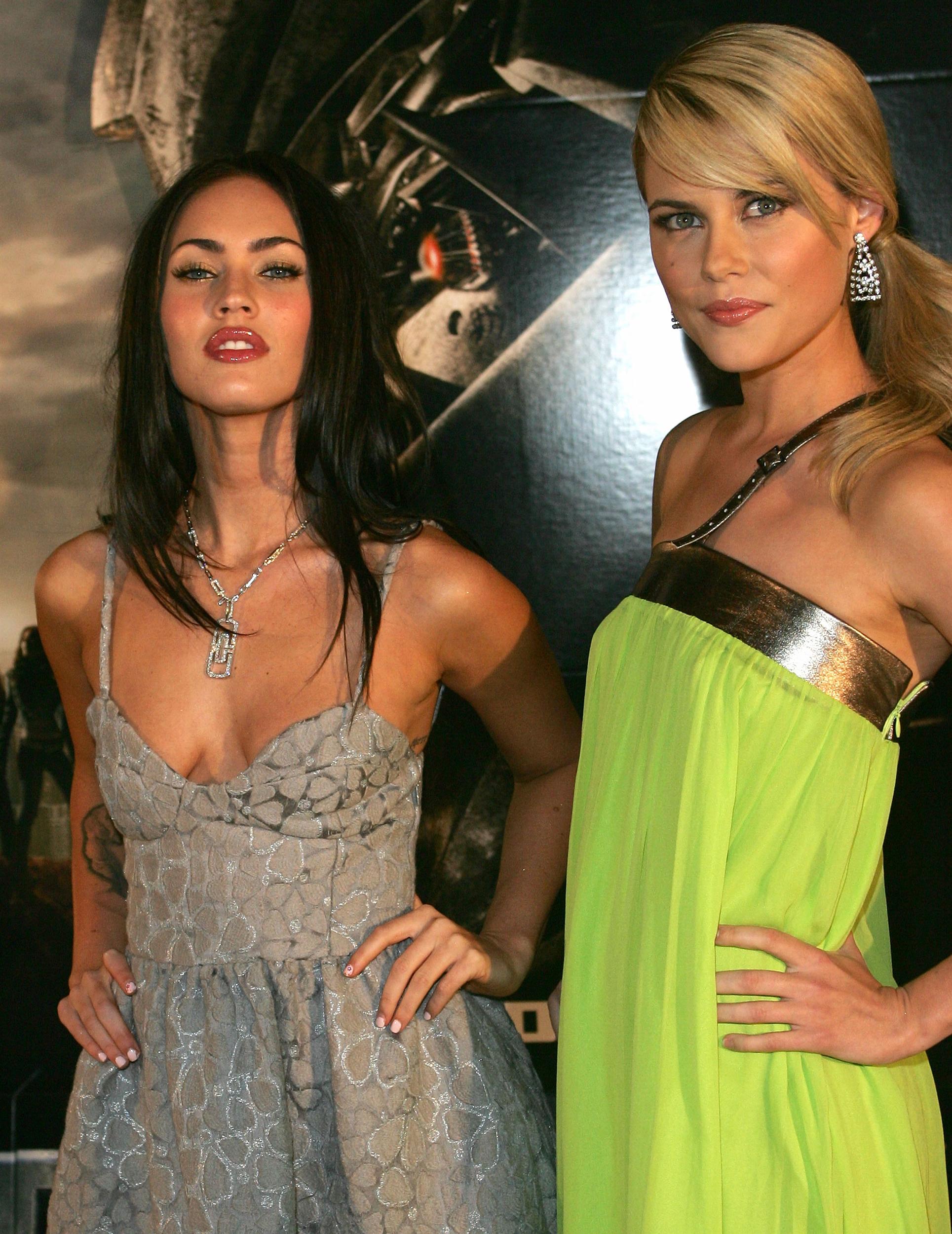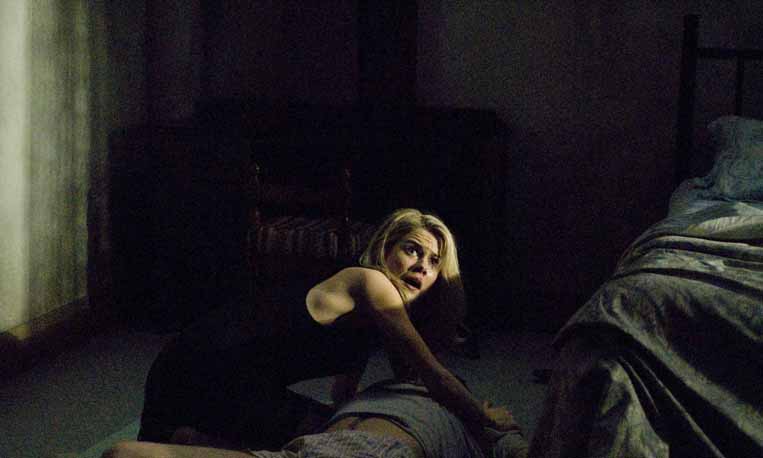 Remaking Asian horror films is a thankless job, but Hollywood keeps on trying. Fans of the originals hate the new versions, and general audiences seem to be losing interest: ONE MISSED CALL and THE EYE, both released earlier this year, made only $26.9-million and $31.0-million, respectively. Hoping to reverse this trend is SHUTTER, starring Joshua Jackson (DAWSON’S CREEK) and Rachael Taylor (TRANSFORMERS), which is based on the excellent 2004 Thai film of the same title, about a young couple haunted by a female ghost that manifests itself in the form of “Spirit Photography.” Rachael Taylor acknowledges that the Thai version of SHUTTER is hard to match; however, she hopes the remake is no mere photo duplicate of the original but rather a new interpretation that brings its own unique focus to the subject.
Remaking Asian horror films is a thankless job, but Hollywood keeps on trying. Fans of the originals hate the new versions, and general audiences seem to be losing interest: ONE MISSED CALL and THE EYE, both released earlier this year, made only $26.9-million and $31.0-million, respectively. Hoping to reverse this trend is SHUTTER, starring Joshua Jackson (DAWSON’S CREEK) and Rachael Taylor (TRANSFORMERS), which is based on the excellent 2004 Thai film of the same title, about a young couple haunted by a female ghost that manifests itself in the form of “Spirit Photography.” Rachael Taylor acknowledges that the Thai version of SHUTTER is hard to match; however, she hopes the remake is no mere photo duplicate of the original but rather a new interpretation that brings its own unique focus to the subject.
“I appreciate that remaking a film in the horror genre is a sensitive thing because people become very loyal to the original film,” she says. “Of course they’ve been remade to varying degrees of success in the West, so I wanted to know what I was up against. It turned out I was up against a lot, because it’s a very, very good film. But it was one of the reasons I wanted to do the movie, because I think it’s such an interesting film. It’s not just a horror movie about a haunted house; it’s dealing with some interesting issues in a relationship. So I felt there was enough for me to explore as an actor. Also, the perspective of our film, the American version, is very different from the Thai version – in the sense that it’s more of a male perspective in the Thai film. It’s about him running away from his past and trying to forget his past. The American version is more about the female character trying to unpack his past. So it’s quite different.”
Unlike ghosts in many J-Horror films, who target victims almost at random (because they happened to watch the wrong videotape or walk into the wrong house), the one in SHUTTER has a very specific motivation: trying to get a message across to the land of the living, so that a grievous wrong will be brought to light. When Ben (Jackson), a professional photographer working in Tokyo, is reluctant to believe he has captured a ghost on film, it falls to his new bride Jane (Taylor) to solve the mystery. Taylor hopes this plot line elevates SHUTTER above the run-of-the-mill horror remake.
“What I like about the film is that it’s not playing an irrelevant female character that’s blond and young and in a ghost house and having horrible things happen to her. She’s proactive in terms of the story. She’s proactive in trying to figure out what these supernatural images mean. And she’s proactive in trying to get to the bottom of what the secret is. When she finds out it is a very changing thing for her, and based on her own personal morality, that’s not something she can forgive. She’s a normal girl, but she’s starts the movie in a very different place… She’s just happy to be married; she just wants to go on the journey, and she has her eyes blissfully shut, if you ask me. She has to pull herself out of that. I think that’s the mark of a strong female character to me.”
Avoiding the mistake made by many remakes of Asian horror films, SHUTTER does not completely Americanize the subject matter. A Japanese co-production, the new version was shot in Japan with a Japanese producer (RING’s Taka Ichise) and director (INFECTION’s Masayuki Ochiai). This presented problems for the Australian actress: besides the language barrier there was also the question of maintaining her American accent. (“One thing is doing an American accent while you’re in America, but it’s more difficult when you’re shooting in Tokyo.”) However, in a skillful display of cinematic jiu-jitsu, Taylor turned the culture shock to their advantage.
“It was tough shooting in a foreign country with a non-English-speaking director,” she says. “It certainly was a challenge. It was cool because they are the same challenges that the character is facing. You got to use that: she’s going through the fish-out-of-water, lost-in-translation experience of not knowing what everything really means. That was the experience I had personally.”
The experience included communicating with director Ochiai through a translator.
“He speaks a little [English] but not in terms of being able to build an intimate [rapport],” she says. “We had an incredible translator. Having said that, translation is certainly useful, but I really felt that I was isolated in terms of performance. I had to make my own choices and was sort of left stranded on my own. Which is not to say that Masayuki Ochiai is not good at what he does; he’s absolutely good at what he does. He understands how to create a creepy scenario very expertly. But it was kind of good to be left to my own instincts as an actor and not just be a warm prop, told where to stand and how to look and what to say. It was cool to have to lock into my own instinct. The character is obviously going through a particular kind of internal turmoil of doubt and questioning her relationship and dealing with the issues of betrayal of trust and secrets and revenge and lies. It was challenging, really challenging. The only job of an actor – which is both a good thing and a bad thing, because you can never really control the outcome of the film – all you can do is take care of yourself; you can just nurture your character. No one knows your character like you do. If you protect that, then you’re doing what you’re being paid to do.”
Taylor credits leading man Joshua Jackson with helping fill the void created by the language problem. The actors play American newlyweds in the remake: whereas the Thai couple were simply living together while the girl went to school, Ben and Jane head to Japan for their honeymoon, followed by a high-paying photo assignment for Ben in Tokyo. Things go wrong when Ben’s pictures are marred by inexplicable glitches.
“I think one of the most important things for me, in terms of telling the story, was to make sure the relationship was plausible in terms of they were blissfully newlywed; they loved each other, and it was an intimate, loving and trusting relationship,” Taylor explains. “Josh was the perfect person to create that with, because he’s an incredibly open and spirited man, and he’s a great actor. More than being a great actor, he’s a cerebral actor, and I really like that. He likes to get into things, and he likes things to make sense; he likes to fuss with the story and all of that stuff, to make it better. He’s really invested in his work, and so I am. So he was a really great comrade to have, and he was so necessary. It was just Josh and I out there. It was a Japanese crew and a Japanese director, so we had to just hang on to each other and take care of each other.”
In particular, Jackson guided Taylor through the scene she considered the most difficult – a car crash that results from running over a mysterious woman on an isolated road. This is the flash-point from which the haunting proceeds, but Taylor was uncertain how to handle the scene, having never been in an actual accident.
“Fortunately Josh was with me, and he was really supportive on that. He was like, ‘When you’re in a car accident, you use every bit of strength that you can to protect yourself from that steering wheel.’ Which you don’t actually know if you haven’t been in a car accident. That’s usually a director’s job, and Masayuki Ochiai said what he could, but the language barrier made it difficult. There are just things that you do in a car accident that are very particular to that experience, so Josh was really helpful guiding me through that.”
The culture shock of filming in Japan was not the only experience that Taylor turned to her advantage. There was also the matter of filmming in places that lent the appropriate atmosphere.
“We shot in some pretty spooky locations: three o’clock in the morning on an old abandoned road; in an old abandoned hospital that was still semi-functioning, where I ended up getting lost while it was raining outside; in this old abandoned Japanese house. People say, ‘Are you really scared when you’re scared?’ It’s kind of your job to be. Actors have different techniques, but I personally like to use my imagination. I’m like ‘What if you were really my husband and you really betrayed me like this?’ That’s what helps me as an actor. It’s different for everyone. I just believe in using my imagination, and I believe in empathy as well. Human beings go through all sorts of horrific things and wonderful things on a day-to-day basis; if you can just imagine what it might be like to be someone like that, then that’s half the job done.”
Another difference from the original version of SHUTTER is that the remake goes to greater lengths to explain the phenomenon of spirit photography to a presumably skeptical American audience. Taylor remains agnostic on the subject.
“I was not skeptical about spirit photography, especially because I had very little understanding of what it was before I shot the movie. But in terms of the world of the supernatural, I wasn’t categorically a non-believer, but I wasn’t categorically a believer, either. I saw somewhere in the middle of not being sure. Then I started doing research on spirit photography, and it’s fascinating. It is a true phenomenon, and there are pictures that have these inexplicable images on them. We can’t explain them as a light mark or a water mark or a technical problem or whatever; they’re just these funny images. Do I believe it now? I think I have the same personal thing on it that the film does, which is that if a supernatural, if a spiritual message needs to make itself heard, then it will find a way to do that. I think that’s a fair call to make. Like if something is so emotionally potent that it needs to find a way to surface, then I think absolutely it’s possible. I’m not checking my pictures at this moment to see if there’s a spirit in it, but touch wood anyway.”
No matter how much the new version struggles to be see in its own light, the original is always there, providing an easy comparison. Did awareness of the Thai film ever come back to figuratively haunt Taylor during filming?
“A little bit,” she admits. “You want it to be respectful. It’s a tricky thing to remake someone else’s piece of art, and you’ve got to be sensitive and you’ve got to be respectful, and I hope that we were. I didn’t direct the film, so I can’t be responsible for the whole thing, but you want to be decent about it and not completely butcher it. I don’t think we did.”
Of course, some fans will inevitably feel different, no matter how good the intentions of the remake. Taylor has already caught a glimpse of the fan reaction to SHUTTER.
“You only make the mistake once or twice of going online and Googling yourself,” she laughs. “Then you never have to do it again. I think the responses to this movie are either really, really positive and they adore it and they’re like ‘it’s a kick-ass female horror movie and we love it,’ or they’re like ‘the original was better” because they have that allegiance to the original film. I think that’s a really great response, if people are in any way split or divided. Mostly what I’ve seen, people have been positive about it. But I think any response is a good response, and these are passionate people, the horror-movie fan-boys. I think that they get involved with film in that way is really cool. I’m never personally offended by it. There’s this one website called ‘The Bastardly’ or something, and it’s so mean, but like I said, I won’t look at it again.”
 With TRANSFORMERS and SHUTTER on her resume, Taylor could be poised to become a genre specialist, but she has also recently completed the non-genre BOTTLE SHOCK, with Alan Rickman and Bill Pullman. Does she enjoy the challenge offered by science-fiction and horror films?
With TRANSFORMERS and SHUTTER on her resume, Taylor could be poised to become a genre specialist, but she has also recently completed the non-genre BOTTLE SHOCK, with Alan Rickman and Bill Pullman. Does she enjoy the challenge offered by science-fiction and horror films?
“I do actually,” she responds enthusiastically. “It’s not to say that’s all I want to make for the rest of my career, but I like the spectrum of emotions that you get to play with when you do a movie like this. You’re dealing with rich and potent emotions. Each day you go to work, you’re dealing with the threat of death and the world of the supernatural, betrayal and secrets and mistrust in a relationship. So you’re playing stakes that are very, very high. And I think that’s great for a young actor, to be thrown into that world, where you’ve got such an array of colors. From the start of the movie, where it’s blissful, happy newlyweds, to the end of the movie where it’s like complete distress.
“I’m a young actor and I’m learning, and every job is a pleasure,” Taylor concludes. “Honestly, it’s such a pleasure going to work as an actor; it’s such a wonderful craft. It’s a total blessing, and everyone wants to help you.”
RELATED ARTICLE: How does SHUTTER rate according to other remakes of Asian horror films? Check out: Remaking Asian Horror: A Brief History.

One Reply to “Interview: Rachael Taylor on "Shutter"”